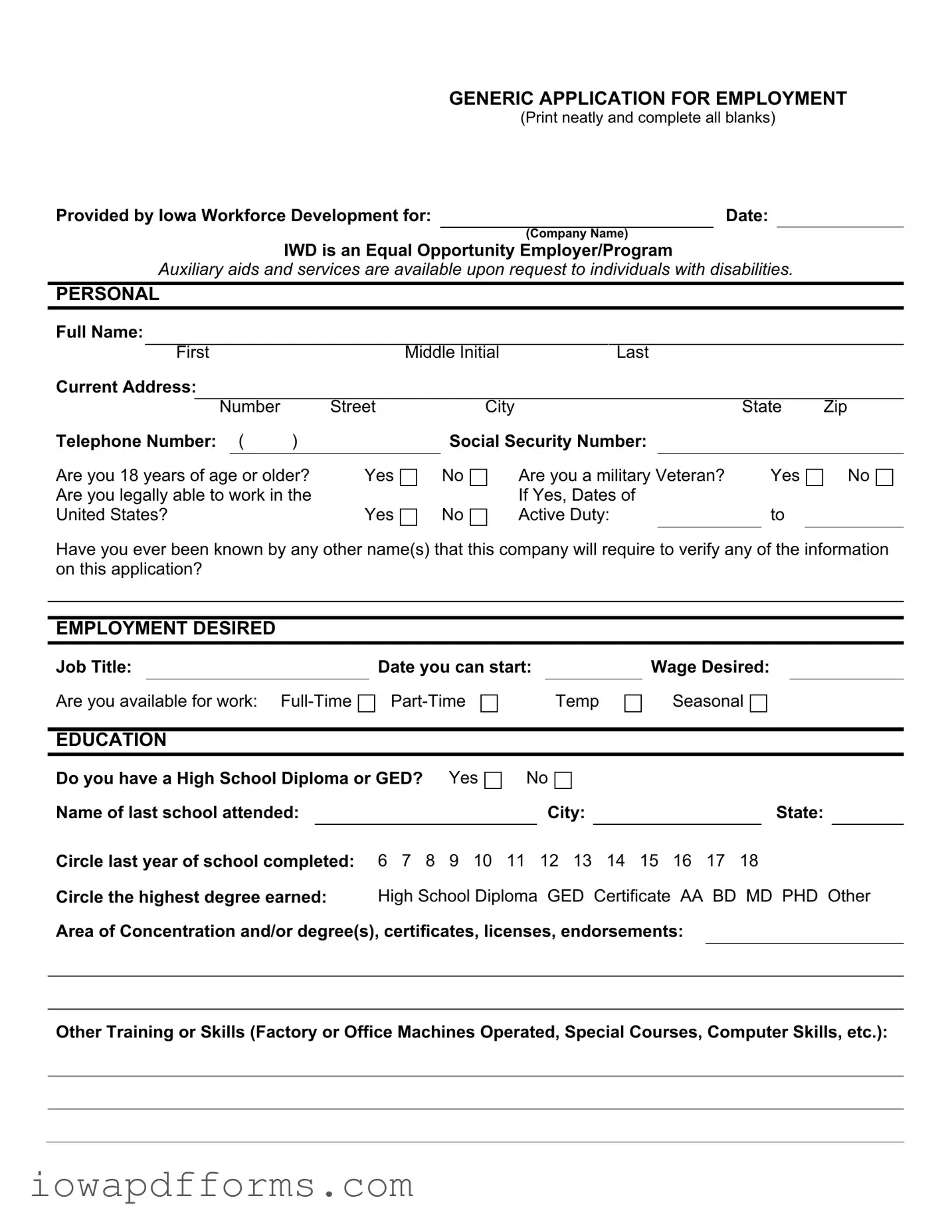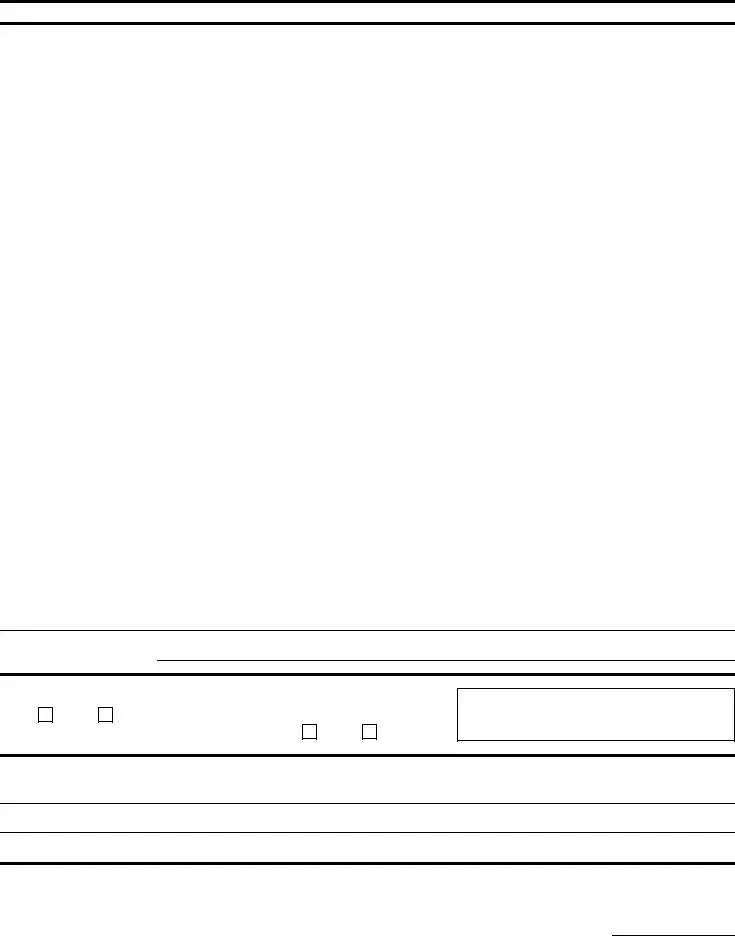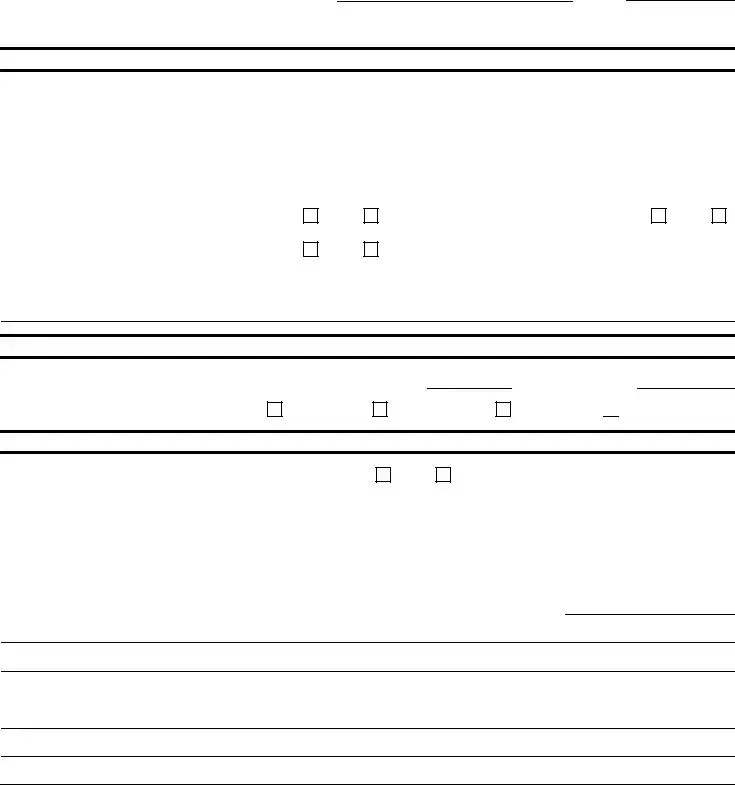The Iowa Application Employment form shares similarities with the standard Job Application form commonly used across various states. Both documents require personal information, such as the applicant's name, address, and contact details. They also ask about the applicant's work eligibility and availability, including whether they can work full-time or part-time. Additionally, both forms typically include sections for employment history, allowing candidates to list previous jobs, responsibilities, and reasons for leaving. This structure helps employers assess a candidate's qualifications and experience systematically.
Another document akin to the Iowa Application Employment form is the Federal Employment Application. This form is used for positions within federal agencies and includes sections for personal information, education, and work history. Similar to the Iowa form, it emphasizes the importance of providing accurate information and may require details about military service. The federal application often includes additional questions regarding veteran status and preference points, which can influence hiring decisions.
The Resume is another closely related document. While it serves a different purpose, it often contains overlapping information with the Iowa Application Employment form. A resume typically highlights an applicant's work experience, education, and skills in a more condensed format. Both documents aim to present the candidate's qualifications to potential employers. However, the resume allows for more creativity in presentation, while the application form maintains a standardized structure for uniformity in the hiring process.
The Cover Letter also bears similarities to the Iowa Application Employment form. While a cover letter is a more personalized introduction to the applicant's qualifications, it often reiterates information found in the application. Both documents provide an opportunity for candidates to express their interest in a specific position and highlight relevant skills and experiences. The cover letter complements the application by offering a narrative that explains why the candidate is a good fit for the job.
In the realm of real estate, documents play a crucial role in ensuring clarity and completeness in transactions. For instance, the Texas Real Estate Sales Contract form serves as a vital resource for buyers and sellers in Texas to establish the terms of their agreement clearly. It's important for those involved in real estate to access and understand this form to avoid any ambiguities in the sales process, and you can find it via Texas Documents.
The College Application is another document that shares a structural resemblance with the Iowa Application Employment form. Both forms require personal information, educational background, and a summary of past experiences. College applications often ask for extracurricular activities and personal statements, which can be similar to the additional information section in employment applications. Both processes aim to evaluate the applicant's suitability for a particular program or position based on their qualifications and experiences.
The Volunteer Application form also has similarities with the Iowa Application Employment form. While primarily used for unpaid positions, volunteer applications often request personal information, availability, and relevant experience. Both forms aim to gather comprehensive information about the applicant to determine their fit for the role. The emphasis on skills and past experiences in both documents helps organizations select suitable candidates, whether for paid employment or volunteer work.
The Internship Application is another document that mirrors the Iowa Application Employment form in many ways. Internships often require similar details, such as personal information, educational background, and work experience. Both applications are designed to evaluate a candidate's potential fit for a role, focusing on skills and experiences that may not yet be extensive. The internship application might also include sections for academic achievements and career goals, which can further inform the selection process.
The Job Application for Nonprofits is similar to the Iowa Application Employment form, as it seeks to gather essential information about candidates applying for positions within nonprofit organizations. Both documents ask for personal details, work history, and educational background. Nonprofit applications may also include questions about the applicant's commitment to the organization's mission, paralleling the Iowa form's inquiry into the candidate's abilities and interests relevant to the job.
Finally, the Online Job Application form shares many characteristics with the Iowa Application Employment form. As technology advances, many employers now offer digital applications that require similar information. Both forms typically request personal details, work experience, and educational background. The online format may streamline the application process, but the fundamental purpose remains the same: to collect information that helps employers evaluate candidates for job openings.




